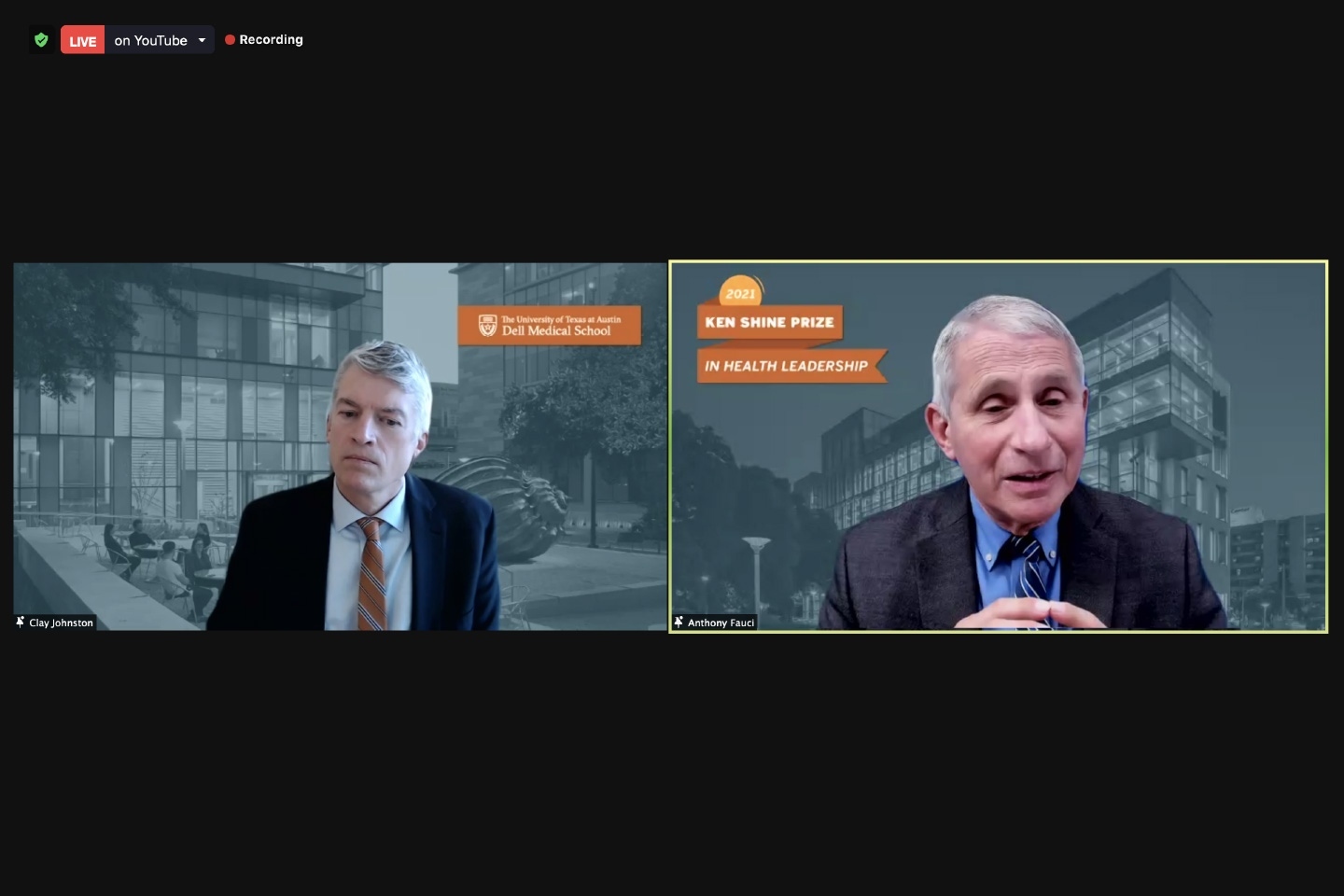Between COVID-19 and the next large-scale disaster lies a critical period. Investment in preparedness and a return to civil discourse (along with trust in science) are what will save us from the pandemic to come, says Anthony Fauci.
“There’s no better example than what we’ve been through over this past year.”
Anthony Fauci, M.D., director of the National Institute of Allergy and Infectious Diseases for nearly four decades and one of the leading members of the Trump administration’s White House Coronavirus Task Force, is for many a bastion of science and reason. But it’s hope that emerged as a touch point today, when he talked to Clay Johnston, M.D., Ph.D., dean of Dell Medical School at The University of Texas at Austin, about the human and economic toll of COVID-19 and how it might finally spur needed investment in disaster preparedness.
“One of the horrible things [about COVID-19] is the impact that this outbreak has had on our economy, to the tune of trillions of dollars,” Fauci says. “If you take a small slice of that and say, ‘We lost trillions and trillions of dollars here,’ maybe a small slice to have a readiness that’s there is not wasted money at all. And when you’re not responding to an outbreak, there are a lot of other good things that you could be doing in the community, from a health standpoint.”
As an alternative to starting from scratch when calamity strikes, Fauci — referencing a timely op-ed published in JAMA early last year that noted that strong support for preparedness might be achieved from an industry damaged by crisis — envisions a system that maintains things like public health corps and reserve manufacturing facilities that could be leveraged to tackle health problems such as access to care when not active in disaster response.
Fauci spoke to Johnston as part of Dell Med’s annual Ken Shine Prize in Health Leadership, awarded to Fauci for his significant contributions to advancing health.
In addition to investing in health infrastructure, the United States must find a way to answer the divisiveness pervading its culture, Fauci says.
The Importance of Engagement

It’s that divisiveness that has led to a duality in Fauci’s reputation: lionized by some, he is, in his words, “Satan” and “a target” to others.
Science’s authority, and Fauci’s own, are challenged by a growing disbelief in fact and the rise of misinformation campaigns that support so-called “alternative facts” with bogus — or no — evidence.
“There are states and cities and regions where the hospitals themselves are being overrun. … In that environment, people still say it’s a hoax, there’s no such thing as COVID-19,” Fauci says. “It seems to me to be unimaginable that when, in your own backyard, that is happening — and at the tune of 3,000 to 4,000 people a day — there are still people who think it’s fake, and it’s made up and it’s a conspiracy. We have a long way to go to try and overcome that, and I think the answer’s not going to be to just blow them aside. … We’ve got to engage and figure out what is it that’s separated us so profoundly.”
Adherence to a belief in the face of conflicting information is directly opposed to science, Johnston notes: “On the science side, we never believe anything really firmly. We’re always questioning whether we have it right; we’re always reexamining; we always are humbled by our ignorance.”
Opportunities in Partnership & Messaging
One aspect of the pandemic that has proven humbling to many health experts and local, state and federal governments alike has been the rollout of vaccines for COVID-19, which has been fraught with miscommunication, confusion and delays. But even earlier, one of the major themes of the response to COVID-19 has been the interplay between local and national planning, Johnston says.
Fauci points to direction, but with flexibility, as the key to effective policy. “There has to be a considerable amount of support and there has to be a considerable amount of partnership,” he says. “To say that the federal government is going to dictate everything that is going to happen I don’t think works because of the diversity among the states. To say to the states, ‘You’re on your own,’ [doesn’t work either]. There has to be some commonality of direction.”
Consistent and strategic communication is a related theme — which Fauci, a veteran navigator of the 24-hour news cycle and social media, likens to armor. “The bane of communication is mixed messaging,” he says, noting that it offers opportunity for distortion and seeds confusion.
Looking Forward
To that end, his adult daughters did not travel to his home to celebrate Fauci’s 80th birthday last month. Hosting a party, particularly one requiring travel, would have been a mixed message from Fauci, who has reliably emphasized the importance of following public health recommendations to prevent the spread of the coronavirus. Still, when this is all over?
“I’m looking forward to getting my children back,” he says.